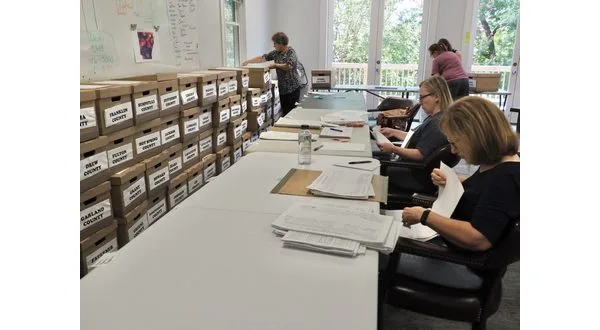
Ann Hudson, Carrie Clay and Marcia Norman sort through thousands of petitions inside the Arkansas Public Policy Panel’s Little Rock office on July 2, 2024. (Mary Hennigan/Arkansas Advocate)
Two Arkansas ballot question committees on Wednesday filed a motion to intervene in a federal lawsuit challenging new direct democracy-related laws.
The American Civil Liberties Union of Arkansas, Elias Law Group LLP and Shults Law Firm LLP filed the motion in the U.S. District Court for the Western District of Arkansas on behalf of For AR Kids and Protect AR Rights. The former is a grassroots coalition that’s received approval from the attorney general to gather signatures for its proposed education-focused constitutional amendment.
The latter plans to file its own proposed ballot initiative for the 2026 election to protect Arkansans’ “right to propose, sign, petition and campaign for ballot initiatives to improve their communities,” according to a Statement of Organization filed with the Arkansas Ethics Commission Friday.
Protect AR Rights is composed of several groups, including Arkansas Advocates for Children and Families, Arkansas Appleseed, Arkansas Citizens First Congress, Arkansas Public Policy Panel, the Arkansas State Conference of the NAACP and For AR People.
“This case is about protecting core political speech,” ACLU of Arkansas Legal Director John Williams said in a statement. “Arkansas voters have a constitutional right to speak out, organize, and propose laws through the ballot initiative process. The laws we’re challenging are deliberate efforts to suppress that speech and silence the voices of ordinary Arkansans in favor of entrenched political power.”
The original lawsuit was filed last month by the League of Women Voters of Arkansas who alleges eight recently approved laws governing direct democracy violate the First and 14th amendments to the U.S. Constitution. The case is assigned to Judge Timothy Brooks.
Arkansans can propose new laws or constitutional amendments and put them to a statewide vote through the direct democracy process. Arkansas is one of 24 states that allows citizen-led initiatives, according to the National Conference of State Legislatures.
The majority of the laws challenged in the lawsuit regulate the petition-gathering portion of the initiative and referendum process. New requirements include directing signature gatherers, known as canvassers, to sign a “true affidavit,” to request a photo ID from potential signers and inform them that petition fraud is a criminal offense, among other things.
According to Wednesday’s court filings, the intervenors want to challenge additional laws, including a 2023 law that requires petitioners to gather signatures from 50 counties instead of 15 counties and Act 602 of 2025, which prohibits ballot titles from being written above an eighth grade reading level. Attorney General Tim Griffin cited the new law for the first time when he rejected a proposed ballot measure from the League of Women Voters last week.
In Wednesday’s filings, the plaintiffs argue that intervening in the League of Women Voters lawsuit is more efficient than filing a separate lawsuit, which they said would likely be consolidated with the League’s complaint under federal court rules.
Legislators and supporters of the new laws have said they will bring integrity to the initiative and referendum process, while opponents argue they will make it nearly impossible for citizens’ proposals to qualify for the ballot. Protect AR Rights spokesperson Bill Kopsky called the laws “a blatant power grab by politicians trying to silence voters.”
“Direct democracy has been under attack in the Arkansas Legislature really since 2012,” he said. “Passing just bill after bill, it’s death by 1,000 paper cuts, making the process harder for people.”
Protect AR Rights formed in 2020 in opposition to Issue 3, a proposed constitutional amendment referred by the Legislature that would have changed the initiative and referendum process by requiring voter petitions to be submitted earlier and increasing the number of counties where signatures must be collected, among other things. Issue 3 failed with 56% voting against it.
Two years later, Protect AR Rights fought against Issue 2, another lawmaker-referred constitutional amendment that would have increased the percentage of votes required to pass constitutional amendments and citizen-proposed state laws from a majority to 60% of votes cast. Issue 2 failed with 59% of voters voting against it.
Kopsky is also part of For AR Kids, which submitted and received approval for its proposed constitutional amendment for the 2026 general election after failing to collect enough signatures for the 2024 election.
After the conclusion of the 2025 legislative session, Kopsky said the group assessed the new laws and volunteers tried collecting some signatures to learn how difficult it would be to comply with the new requirements. The regulations were “so onerous that it’s nearly impossible to collect signatures,” which is why the group decided to seek to join the League of Women Voters’ lawsuit, he said.
“We just view ballot measures as a fundamental right in the Constitution, obviously, but we also see it as a way to cut through the partisanship that is caused by our politicians and special interests,” Kopsky said. “Arkansans tend not to be super political, which I love about us. It’s not about what camp you’re in, it’s what can we do to make our community better.”
To view this story, or for more news updates from Arkansas Advocate, click here.
WebReadyTM Powered by WireReady® NSI










